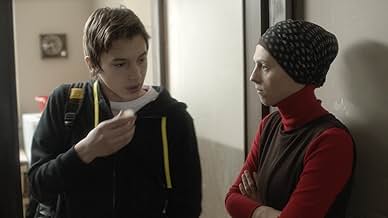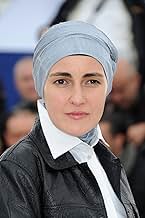IMDb-BEWERTUNG
6,4/10
694
IHRE BEWERTUNG
Füge eine Handlung in deiner Sprache hinzuSiblings Rahima and Nedim are the Bosnian war orphans. She works as a restaurant chef and earns just enough money to survive.Siblings Rahima and Nedim are the Bosnian war orphans. She works as a restaurant chef and earns just enough money to survive.Siblings Rahima and Nedim are the Bosnian war orphans. She works as a restaurant chef and earns just enough money to survive.
- Auszeichnungen
- 5 Gewinne & 4 Nominierungen insgesamt
Vedrana Bozinovic
- Kirina kcerka
- (as Vedrana Seksan)
Handlung
WUSSTEST DU SCHON:
- WissenswertesThe official entry of Bosnia and Herzegovina to the Best Foreign Language Film at the 85th Academy Awards 2013.
- VerbindungenReferences Taxi Driver (1976)
Ausgewählte Rezension
Set in post-Civil War Bosnia, DJECA (CHILDREN OF SARAJEVO) creates a dystopian world of perpetual darkness, dingy streets peopled with shady characters, anonymous concrete underpasses full of menace, and seedy clubs ruled by autocratic conpersons. The only way to survive, it seems, is by buying and selling things - mostly illegally.
Rahima (Marija Pikic) struggles to survive in this society by working long hours in a kitchen and using the proceeds to look after her brother Nedim (Ismir Gagula). The task is not an easy one, as her boss Melic (Velibor Topic) keeps asking her to work extra hours at very short notice. She becomes suspicious that Nedim is becoming involved in some criminal deals, and follows him one morning. She becomes embroiled in a complicated plot that ends up with Nedim being assaulted, and both she and her brother being arrested (wrongfully) for attacking Melic.
Aida Begic's film is quite difficult to watch, not least for the fact that her camera seldom moves away from the close-up. The action unfolds in a series of lengthy tracking shots, with the camera moving with the characters along the danger-laden streets of Sarajevo. We share their sense of foreboding as they have no idea of what might await them behind the next concealed corner.
The thriller aspect of the film is complicated by religion: Rahima has converted to Islam, a decision still not really accepted by her family, who believe that she has somehow rejected her upbringing. At one point we are asked to reflect on why she did it; was it a political decision? or was it simply an act of self-assertion? Director Begic offers no answers, although she does suggest that Rahima's conversion has helped her to deal with the trauma of the civil war that still haunts her mind.
The film opens and closes with an extract from Beethoven's Pastoral Symphony - an apt reminder of how some kind of stability can be forged, even in the most unprepossessing of situations. Rahima and Nadim end the film much closer to one another than they were at the beginning, as they realize that familial loyalties provide one form of protection against any form of corruption.
Rahima (Marija Pikic) struggles to survive in this society by working long hours in a kitchen and using the proceeds to look after her brother Nedim (Ismir Gagula). The task is not an easy one, as her boss Melic (Velibor Topic) keeps asking her to work extra hours at very short notice. She becomes suspicious that Nedim is becoming involved in some criminal deals, and follows him one morning. She becomes embroiled in a complicated plot that ends up with Nedim being assaulted, and both she and her brother being arrested (wrongfully) for attacking Melic.
Aida Begic's film is quite difficult to watch, not least for the fact that her camera seldom moves away from the close-up. The action unfolds in a series of lengthy tracking shots, with the camera moving with the characters along the danger-laden streets of Sarajevo. We share their sense of foreboding as they have no idea of what might await them behind the next concealed corner.
The thriller aspect of the film is complicated by religion: Rahima has converted to Islam, a decision still not really accepted by her family, who believe that she has somehow rejected her upbringing. At one point we are asked to reflect on why she did it; was it a political decision? or was it simply an act of self-assertion? Director Begic offers no answers, although she does suggest that Rahima's conversion has helped her to deal with the trauma of the civil war that still haunts her mind.
The film opens and closes with an extract from Beethoven's Pastoral Symphony - an apt reminder of how some kind of stability can be forged, even in the most unprepossessing of situations. Rahima and Nadim end the film much closer to one another than they were at the beginning, as they realize that familial loyalties provide one form of protection against any form of corruption.
- l_rawjalaurence
- 11. Jan. 2016
- Permalink
Top-Auswahl
Melde dich zum Bewerten an und greife auf die Watchlist für personalisierte Empfehlungen zu.
Details
Box Office
- Weltweiter Bruttoertrag
- 38.920 $
- Laufzeit1 Stunde 30 Minuten
- Farbe
Zu dieser Seite beitragen
Bearbeitung vorschlagen oder fehlenden Inhalt hinzufügen

Oberste Lücke
By what name was Djeca - Kinder von Sarajevo (2012) officially released in Canada in English?
Antwort


























